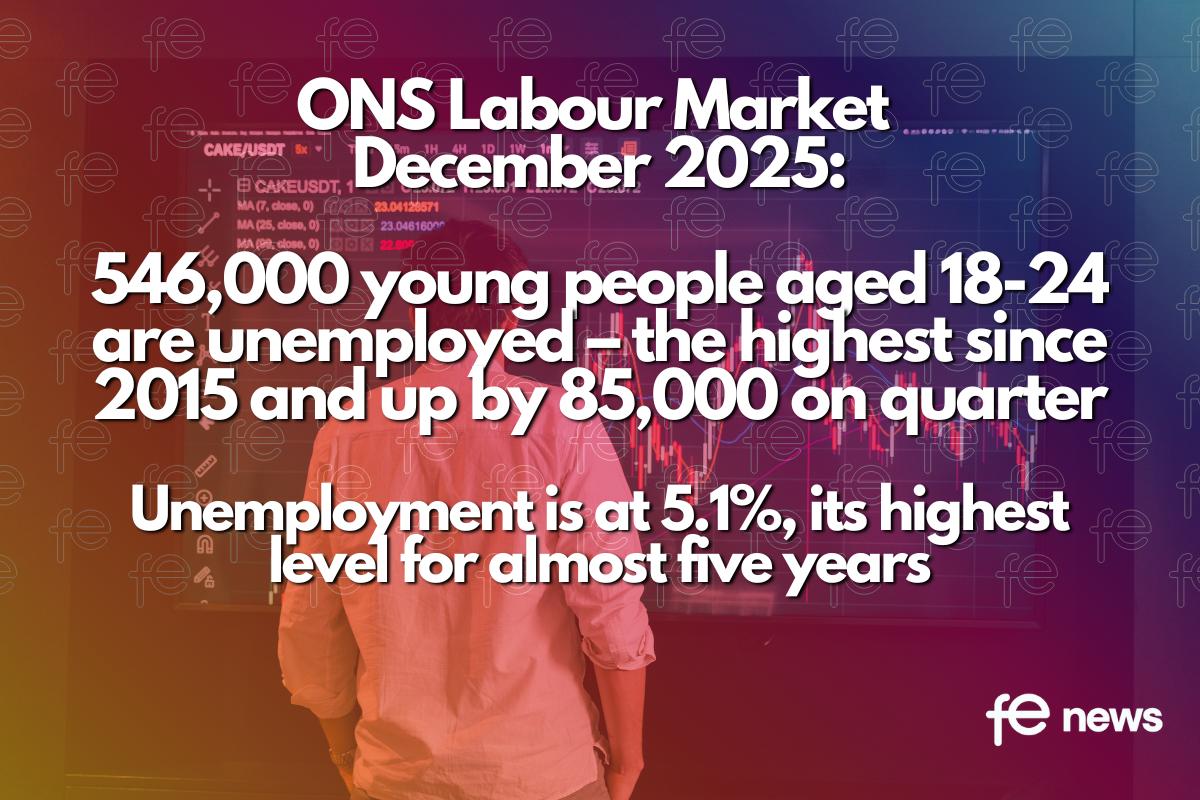Independent Commission on The College of the Future launch UK-wide final report: #CollegeoftheFuture

Lifelong learning central to helping people and businesses rebound from the pandemic, says Sir Ian Diamond
Radical, long-term education and skills reforms and investment are needed to address current and future skills gaps and transform life chances for every adult.
The Independent Commission on the College of the Future calls for colleges to be placed front and centre of those reforms across the UK’s four nations in its ground-breaking new report published today (28 Oct).
Today’s report, The College of the Future, calls for every adult to have the right to lifetime education and training, with colleges better supported to deliver this in every community across the UK. The Commission has set out how colleges can be supported across the four nations of the UK to deliver the lifelong learning and business support needed for people, employers and communities to survive and thrive in the future. The vision and recommendations are endorsed by leaders from across business, academia, unions, colleges, and the student body from all four nations.
Recent research from CBI found that nine in ten people will need new skills by 2030 to support the future economy, and that further and faster action is needed. The case for action is clear: Covid-19 consequences, leaving the EU, climate change and the fourth industrial revolution mean that everyone will need access to part-time, adult and vocational education as the economy and jobs change.
Radical change is needed in education and skills policies and systems so that colleges can encourage people to train, upskill or acquire new skills throughout their lives for the jobs of tomorrow.
The recommendations in today’s report call for the changes that are needed for colleges to deliver on lifelong learning.
- Provide grants and loans that allow college students to live well whilst studying to bring down barriers many adults face to further study and training, particularly those on low incomes, in precarious employment, and for those who require retraining or upskilling opportunities (due to Covid-19 and labour market changes). It will also offer equity for students across further and higher education by reflecting the specific additional support that particular groups will need – including childcare costs, travel costs, additional funding to support disabled students and scrapping limits when claiming benefits.
- Establish a new service through college employer hubs to tackle skills gaps, giving businesses a one-stop shop for upskilling current employees, finding the skilled workers they need, as well as innovation support, for example prototyping.
- Overhaul, rebalance and integrate the whole post-16 education and skills system in each nation with a 10-year strategy for how colleges will deliver what each nation’s economy and society needs and redressing funding inequity where it exists
The report is the first time that experts and leaders from across the four nations of the UK have come together in this way. It argues that there are key themes that have to be developed and reaffirmed in each of the four nations, to meet common challenges that all nations face. This report will be followed by short reports setting out how to deliver these recommendations in the specific policy contexts of each nation.
The vision that the Commission set out in July was for the college of the future to empower people throughout their lives with the skills they need to get on in life, support better productivity and innovation of businesses, and strengthen every community’s sense of place.
Sector Response
COMMENTS FROM POLITICIANS
 Kate Green MP, Labour’s Shadow Education Secretary, responding to the College of the Future report, said:
Kate Green MP, Labour’s Shadow Education Secretary, responding to the College of the Future report, said:
“This report rightly recognises the vital role colleges play in supporting the life chances of so many people.
“Labour have repeatedly said that giving people the opportunity to retrain and upskill is essential for our economic recovery, and our colleges must be at the heart of that.
“After years of neglect by consecutive Conservative Governments it is crucial that they urgently give the sector the support it deserves.”
COMMENTS FROM COMMISSIONERS
 Peter Cheese, Chief Executive CIPD, and member of the Independent Commission on the College of the Future, said:
Peter Cheese, Chief Executive CIPD, and member of the Independent Commission on the College of the Future, said:
“As we face a more changeable future, better support for organisations and individuals to upskill and reskill is of critical economic and societal importance.
“Colleges should play a major part in this with their natural community connection, focus on vocational and employability skills, and through enabling lifelong learning.
“Building stronger partnerships with employers and with proper funding, now is the time to reinvigorate this sector for all our futures.”
Lesley Giles, Director of Work Advance and member of the Independent Commission on the College of the Future, said:
“We are witnessing huge transformations in the global world of work, with substantial implications for local communities and how people live and work in the UK. This raises vital questions for the future role of colleges and the broader education system.
“Whilst Covid-19, has had an enormous impact in its own right today, this comes on the back of longer running global forces for change which are creating much uncertainty for the future. An increasing pace of technological advances and innovations in ways of working are challenging notions of jobs for life and calling for more people to retrain throughout their careers to enhance their labour market resilience. Colleges at the heart of local communities are central to inspiring stronger workforce development, and driving a lifelong learning revolution necessary to support future economic success and social prosperity for all.”
Nora Senior CBE, Executive Chair, UK Regions & Ireland, Weber Shandwick, and member of the Independent Commission on the College of the Future, said:
“Many of the assumptions that we, business and communities, held before COVID-19 are no longer valid. We need a new approach to economic recovery to meet this challenge. The publication of the College of the Future report is most opportune, particularly in setting out a roadmap for a much closer working relationship between business and colleges. Business needs to get behind this new approach.”
David Jones OBE DL, former Chief Executive of Coleg Cambria, and member of the Independent Commission on the College of the Future, said:
“Colleges are already key institutions in their communities, delivering for local people and businesses. It is clear that the UK now needs modern and high-performing college sectors more than ever, particularly with the many skills challenges each nation faces, and the added challenge of the Coronavirus. I believe that the vision we set out today provides a route map for colleges, one that will provide support and challenge in equal measures.
“Colleges must have an appetite for change, in order to address the ambitions we have outlined in the report. Developing digitally powered pedagogy, embracing technology and embedding blended teaching and learning are key, and here to stay, as we’ve seen in recent months. This will need a greater and ongoing investment in technology and connectivity, recognising that the physical scale and presence of colleges must change. This will count for nothing without a huge focus on the development of the college workforce, through support for ongoing professional training and an evolution in working practice to add maximum value for learners in an outward facing digitally enabled network of UK-wide colleges.
“The ‘can do’ sector needs to demonstrate the active leadership necessary to grasp this opportunity so that colleges in Wales – and across the UK – can deliver lifelong learning for future generations and the prosperity and innovation for our businesses. This will also mean working more effectively with and respecting the roles of schools, training providers and universities to provide a better integrated post compulsory education and training system, that removes nugatory competition. to maximise the benefits for learners, of every pound spent.”
 Sir Ian Diamond, Chair of the Independent Commission on the College of the Future and UK National Statistician said:
Sir Ian Diamond, Chair of the Independent Commission on the College of the Future and UK National Statistician said:
“Colleges are vital yet under-utilised institutions that offer the transformational learning and support that our four nations need now, more than ever, if we are to face the long term impacts of COVID-19 and to drive a sustainable, inclusive economy.
“We must all commit to a bold ambition on skills. Lifelong learning is the only way to ensure people and businesses will survive the recession and thrive in the future. With the right support, colleges can deliver on this urgent need for every community.”
 Matthew Fell, CBI Chief UK Policy Director and member of the Independent Commission on the College of the Future said:
Matthew Fell, CBI Chief UK Policy Director and member of the Independent Commission on the College of the Future said:
“CBI-McKinsey analysis suggests that as automation transforms the nature of work, widespread reskilling will help society unlock the benefits of new technologies, support job creation and tackle inequality. Colleges have a vital role to play in this, and the Commission’s report sets out a bold vision for how institutions can collaborate with businesses to boost the life chances of people from all backgrounds.
“We have the opportunity of a lifetime to revamp further education, and place partnership between institutions and employers at its heart. This will help colleges provide more tailored support to local labour markets, and empower individuals to develop the skills they need to succeed.”
 Stephen Farry MP, Member of Parliament for North Down and member of the Independent Commission on the College of the Future, said:
Stephen Farry MP, Member of Parliament for North Down and member of the Independent Commission on the College of the Future, said:
“Colleges were already uniquely placed to provide a dual function of economic support alongside social inclusion.
“Embedded within the community, the FE sector can respond to local circumstances and the needs of employers in areas such as apprenticeships.
“In the Covid age, the flexibility of colleges is more advantageous than ever.”
 Marie-Thérèse McGivern, Former Principal and Chief Executive of Belfast Metropolitan College and member of the Independent Commission on the College of the Future, said:
Marie-Thérèse McGivern, Former Principal and Chief Executive of Belfast Metropolitan College and member of the Independent Commission on the College of the Future, said:
“The Commission today sets out an ambitious and solution focussed vision for a college sector finally recognised as a fundamental part of an economically and socially successful UK. This vision is for a sector that is supported to provide the spine for transforming the lives of individuals, for enhancing the innovation and enterprise of business and for creating dynamic places and communities.
“Crucially this is a vision of college leaders from across the four nations on the Commission – those who know colleges best. The potential impact for a well-resourced and recognised sector to transform all our futures is enormous – the report sets out how this can happen across the UK.”
 Amanda Melton CBE, Principal and Chief Executive of Nelson and Colne College Group and member of the Independent Commission on the College of the Future, said:
Amanda Melton CBE, Principal and Chief Executive of Nelson and Colne College Group and member of the Independent Commission on the College of the Future, said:
“It is essential that we take full advantage of the transformational potential of colleges to deliver on the lifelong learning and skills-led recovery that our society and economy needs. From the beginning of the Commission we knew we needed to affirm and renew the crucial role of colleges within the skills and education system to assure the appropriate investment we need, especially in England.
“Urgent action is needed to take the vision and recommendations we set out today forward. Top of the agenda is to reform the system that colleges operate in. The days of forcing colleges to compete are numbered, and people across the English sector recognise that what we need now is a coherent, connected education and skills system to deliver for our communities. The anticipated FE White Paper represents a phenomenal opportunity to take forward these reforms.”
 Professor Ewart Keep, Emeritus Professor in the Department of Education, University of Oxford, and member of the Independent Commission on the College of the Future, said:
Professor Ewart Keep, Emeritus Professor in the Department of Education, University of Oxford, and member of the Independent Commission on the College of the Future, said:
“We want colleges to have a bigger role in lifelong learning, in helping businesses to innovate and improve, in supporting productivity improvements, and in strengthening a sense of place and purpose in their locality. To achieve this, the report argues for more stable long-term funding models, and greater cooperation between colleges, and between colleges and other educational providers, such as universities. The aim is to create coherent local education systems that can deliver for people of all ages in a way that is tailored to meet local economic, social and cultural needs.
“Much of what the report argues for is already happening, in pockets, around various parts of the UK. Our vision for 2030 is to ‘level up’ practice, provision and thinking across all four UK nations so that what is path-breaking today is the commonplace of tomorrow. Colleges have the potential to do and be so much more than now.
“In a world where economic dislocation and its social consequences loom large, and where ‘levelling up’ is the slogan of the moment, colleges have the potential to deliver better outcomes for people, places and for productivity and economic success.”
Rob Humphreys CBE FLSW, Council member for Higher Education Funding Council for Wales and member of the Independent Commission on the College of the Future, said:
“Access to relevant vocational and technical training has never been more important to our future prosperity across the four nations of the UK. To respond to short term challenges like the pandemic and long term trends like the fourth industrial revolution, we need refreshed and innovative policies that start from future needs of employers and learners – and learners as citizens – of all ages. That is what a statutory right to lifelong learning and the vision of the college of the future we set out today can deliver.
“In Wales, this kind of debate has been taking place over recent years but the need for a renewed focus on further education is no less urgent. The fall-out from COVID, the challenges of Brexit and the need for enhanced skills and greater productivity within the Welsh economy loom over us like a coming perfect storm. We need to be ambitious and innovation in re-thinking the role and form of our colleges and how they work with employers and link to other parts of our educations sector.”
Audrey Cumberford FRSE MBE, Principal & CEO Edinburgh College and member of the Independent Commission on the College of the Future, said:
“Predictions of the potential for a global pandemic have circulated for many years, reinforced by the emerging conditions that could contribute to making this a reality; climate change, massive urbanisation, a global economy and growth in international air travel. Our report reflects a deep dive into how colleges can best be empowered to respond to these conditions. Scotland has undergone really important reforms over the past decade, putting us in a real position of strength that the Commission has learnt from.
“The ongoing Scottish Funding Council’s (SFC) review represents a serious opportunity to develop a more coherent, agile and integrated tertiary education system that will support colleges to deliver even more for our people, employers and communities. If ‘education is the passport to the future’ then my hope is that this report stimulates discussion, debate and thinking across our sector, policy-makers and funders to start preparing for our future today.”
COMMENTS FROM OUR EXPERT PANEL
Jisc’s MD for FE and skills, Robin Ghurbhurun, who’s a member of the commission’s expert panel, said:
“I welcome this report as a catalyst for change – change in the way the FE sector prepares today’s learners for the workplace of tomorrow and provides them with the digital skills the UK economy needs. Our own research highlights the urgent requirement to support teachers to develop confidence delivering engaging online learning. With the right investment, we can help make technology-enhanced education the norm, rather than the exception.
“Even before the pandemic, FE providers were front and centre in the government’s plan to close the technical skills gap and provide an economic boost. Post lockdown, that aim is even more urgent. My hope is that the College of Future’s report, which resonates with Jisc’s FE and skills strategy, will make a compelling case for change ahead of this autumn’s FE and skills white paper.”
COMMENTS FROM SUPPORTERS AND STAKEHOLDERS
 Association of Colleges’ Chief Executive, David Hughes said:
Association of Colleges’ Chief Executive, David Hughes said:
“This is an exciting report from the Commission on the College of the Future, setting out a compelling vision and clear recommendations. It is significant because it represents a strong consensus about the role and purpose of colleges as well as the urgent need to put colleges and access to lifetime learning and training at the heart of the country’s rebuild. Colleges do a great job now, but this report shows that with the right policy, funding and regulation they can deliver so much more. In a rapidly changing world, with demographic and climate change challenges, we need colleges more than ever.
“The report is a positive vision which challenges governments, employers and colleges themselves to build a new system which works better for us all. It places colleges at the heart of their communities and leading in local labour markets. It asks employers to work in long term partnerships with colleges to develop the human capital for their businesses to be successful. It builds on the collaboration between colleges and with other education which the report shows will be vital to offer a more coherent and efficient post-16 education and training system for everyone.
I am confident that the report has already influenced thinking in the four nations, and in England it will be reflected in the forthcoming white paper. We have a Prime Minister who showed in his Exeter College speech last month that he understands why colleges need a stronger strategic position and a Secretary of State who has made this his priority. The pandemic has shown that colleges are special, but that more needs to be done to support their resilience and their abilities to support more people to get the skills and education they need and deserve.”
 Liz Bromley, CEO of NCG commented:
Liz Bromley, CEO of NCG commented:
“This report could not come at a more critical and relevant moment. As the country prepares to greet a range of unprecedented challenges it is more obvious than ever that colleges – with their deep community links and range of partnerships – will be a cornerstone of future prosperity and mobility.
“In particular, we welcome the report’s badly needed focus on lifelong learning. As our society and economy are changed by COVID-19, digital transformation and an ageing population, new systems and ways of thinking will be desperately needed to support learning and re-training for people of all ages and at every stage of life. This is something NCG Colleges are already engaged in and we are grateful for the practical recommendations in the Commission’s extensive report”.
 UCU general secretary Jo Grady said:
UCU general secretary Jo Grady said:
‘This report rightly highlights the central role staff will play in providing excellent quality further education over the coming years. But this will be impossible if colleges are unable to attract staff by constantly being outbid by other parts of the education sector.
“College teachers have suffered a decade of cuts, redundancies and pay suppression as further education has borne the brunt of austerity. We now need college leaders to work with us to fight for the funding the sector needs to pay staff properly, so we can meet the vision for lifelong learning outlined in the report.’
Ricky McMenemy FRSA, FCGLI, Chair of FETL, said:
“FETL has been very glad to support this major work since its inception and the report before us today proves to be distinct both in the depth and scale of its research and in the range of ambitions it sets before us all. The greater cohesion and connectedness of the education and skills systems, working more closely with employers, accessible to all and with certainty of funding, are fundamental features for colleges to thrive, rightly highlighted here. This is a report ready for these times and purposes ahead for all four nations: a strong blueprint for the future, much needed and much supported by us.”
 Graham Hasting-Evans, Managing Director, NOCN, said:
Graham Hasting-Evans, Managing Director, NOCN, said:
“NOCN Group has been pleased to work with the Commission for the past year as they aim to answer the question – What do we want and need from our colleges from 2030 onwards, and how do we get there?
“As a progressive educational charity with a social rather than commercial focus, we are at the forefront of vocational skills development and apprenticeships. Our history is rooted in upskilling our learners and we welcome the Commission’s recommendations in particular those in relation to a national strategy, lifelong learning, partnering with businesses and focusing on local priorities.
“Colleges need to be seen as the local ‘anchor’ organisation for skills and we hope that the UK Government will take this on board when it publishes its proposals shortly on FE.”
 NUS Scotland President, Matt Crilly, said:
NUS Scotland President, Matt Crilly, said:
“NUS Scotland welcomes the publication of the Commission on the College of the Future report. This report rightly recognises the important role that colleges play in Scottish society, and the need to create a sustainable funding model for the sector that enables students to succeed. We look forward to continuing to work together with students’ associations, colleges and the Scottish Funding Council to take forward these recommendations.
“We’re particularly pleased to see the commission’s recommendation on improving the diversity of college leaders, and the need for a statutory commitment to lifelong learning. NUS Scotland has long campaigned for parity in student support for college and university students, and welcomes the Commission’s endorsement of this.”
 Shona Struthers, Chief Executive of Colleges Scotland, said:
Shona Struthers, Chief Executive of Colleges Scotland, said:
“The report from the Independent Commission on the College of the Future highlights the vital role colleges play – in Scotland and across the UK – in equipping people with the training and qualifications they need to secure skilled jobs and improve their life chances.
“We welcome and support the Commission’s three recommendations to increase support for colleges and improve access for students, so that the sector is best able to support future skills requirements, the call to introduce employer hubs to drive innovation and strengthen links with industry, as well as working collaboratively to address national priorities across the economy and society.
“We look forward to seeing how we can take these recommendations forward when the nation-specific report for Scotland is published.”
 Mark Farrar, Chief Executive, AAT, said:
Mark Farrar, Chief Executive, AAT, said:
“Colleges play a pivotal role in their local communities throughout the UK, and we welcome today’s report from the Commission which shows how key they are to equipping current and future employees with the skills to succeed in a rapidly changing, modern work environment.
“Given the ongoing impact of Covid-19 and the uncertainty surrounding Brexit, now more than ever it is vital to ensure access to upskilling and reskilling for everyone, whatever their age or previous background. As we have seen with many of our own AAT students – whether studying full-time or alongside work – those who are given the right skills often go on to greater things in the profession and develop their careers, including progressing on to roles such as finance director or chief executive as well as running their own accountancy practice.
“By investing now to support and strengthen colleges and ensure they are providing skills and training which benefits individuals and businesses in their areas, we can create a workforce that is able to adapt to local needs and thrive in the workplaces of the future.”
CCCG Chief Executive Roy O’Shaughnessy and Chair Alastair Da Costa said:
“This report sets out an exciting, bold and ambitious vision for further education colleges.
“It places colleges where they belong – at the heart of their communities, working with employers, Government, students and each other, to deliver the training and skills support that their communities need to succeed.
“Through our own initiatives, including our free courses for everyone up to Level 2, and our wide range of free online courses in response to the COVID-19 pandemic, we, like many other colleges are already innovating and making it easier for economically-deprived people to learn.
“We stand ready to do much more, and look forward to working with other London educators, businesses, the GLA and out local authorities to turn this bold vision into reality.”
The Independent Commission on the College of the Future – launched in Spring 2019 – is asking two simple but fundamental questions:
- What do we want and need from colleges across the UK in 10 years’ time?
- And what changes are needed in order to achieve this?
Chaired by the UK’s National Statistician Sir Ian Diamond, the Commission is leading the conversation on how colleges can play an expanded role for people, employers and communities to meet the challenges we face in the next decade.
The Independent Commission on the College of the Future is made up of leaders from across business, academia, unions, colleges, and the student body from all four nations. The Commission has hosted or presented at over 150 events across the UK, including with senior college leaders, governors, staff and students, employers, universities, schools, local, regional and national governments, unions and many others.
The Independent Commission has benefited from learnings across the four nations of the UK, drawing lessons and insights from reform trajectories and from exemplary institutional practices. The Commission is kindly supported by 9 organisations: Association of Colleges, City & Guilds, Colleges Scotland, Colleges Wales, FETL, Jisc, NOCN, NCFE and Pearson.
In England, the UK Government is anticipated to publish an FE White Paper later this year. In Northern Ireland, the OECD recently published a report into Skills Strategy as part of a review of the tertiary system. In Scotland, the Scottish Funding Council (SFC) is conducting a review: Coherence and Sustainability: A review of Scotland’s Colleges and Universities. The Phase One Report: Insights to Develop Further was published this month. In Wales, there are ongoing 14-19 curriculum reforms and a vision for post-compulsory education and training is being developed.











Responses